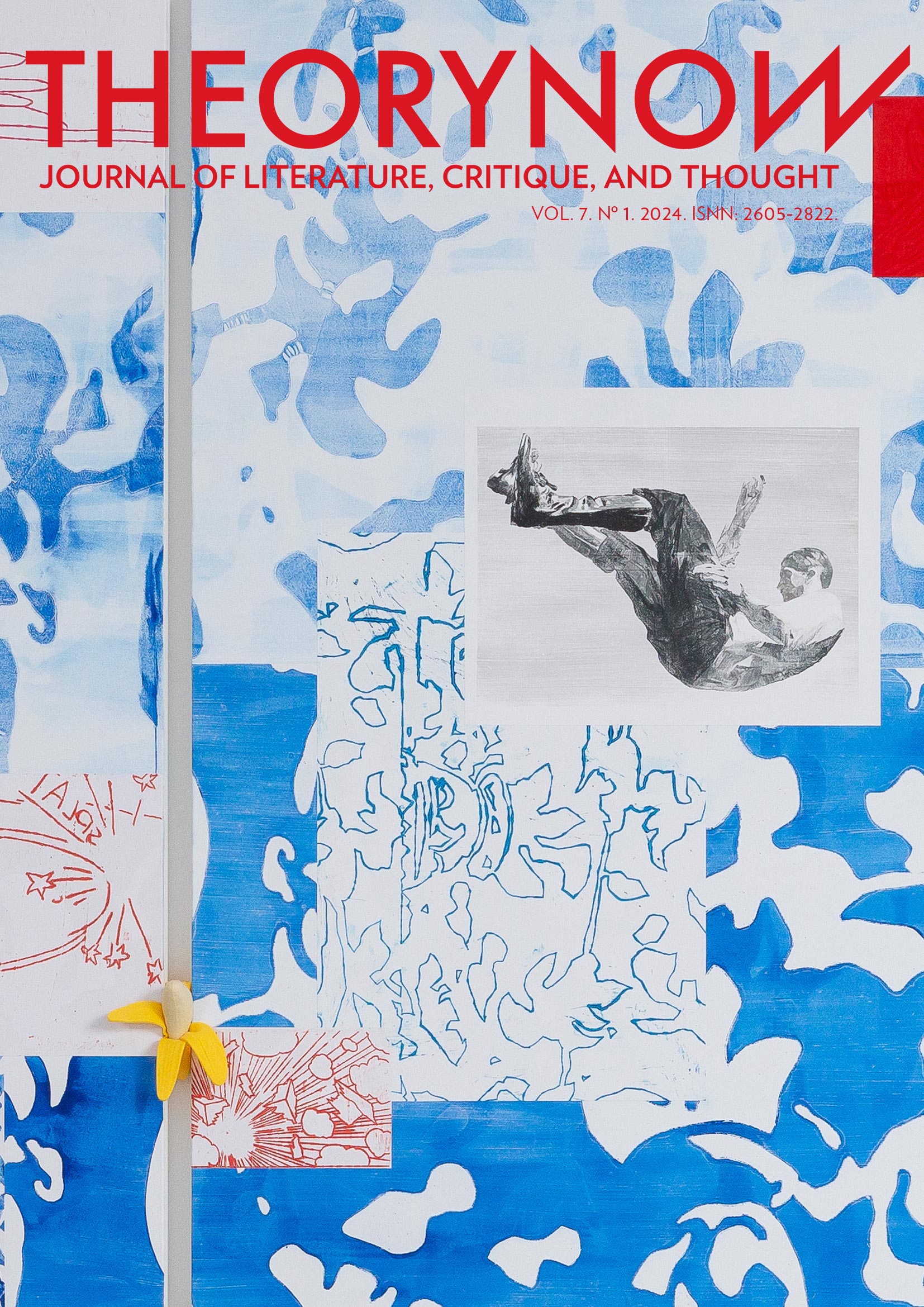Literatura y filosofía: Rancière y el reparto del sentido
DOI:
https://doi.org/10.30827/tn.v7i1.29118Palabras clave:
Hegel, Literatura, McCullers, Filosofía, queer, Rancière, romanticismo, Schlegel, LecturaResumen
Si la política consiste en reabrir el orden de los lugares asignados a los seres y a las ideas, entonces filosofar con la literatura, al deshacer el reparto de campos y disciplinas, es un acto político. Al practicar esta indistinción de dominios, Jacques Rancière parece sin embargo descuidar en su práctica lectora lo que implica una diferencia: hace de la obra filosófica el fragmento de un pensamiento unívoco, cuya cita podría resumir el significado, pero descuida las identificaciones plurales que exige la literatura, la cual podría, por otra parte, ser uno de los medios políticos que el propio filósofo le atribuye. Además de la compleja subjetivación y el trabajo narrativo de la causalidad, la obra literaria se caracteriza por la desidentificación, no solo ante los personajes y lectores, sino también la que la caracteriza a sí misma. ¿No deberíamos entonces trazar una distinción entre el “rigor” filosófico evocado en El maestro ignorante y la potencialización de una obra literaria abierta a infinitas lecturas? Que la literatura sea un espacio de dehiscencia con virtud política implica que su lectura suspende no solo los sentidos habituales, tal como los designa el “reparto de lo sensible”, sino también la asignación definitiva de un sentido, para reconocer esa alteridad radical que se resiste a una identificación, la de la obra como sujeto. También en este sentido la obra literaria es un modelo de singularidad política.
Descargas
Citas
Aristote. Poétique. Traduit par Pierre Destrée. Paris, Flammarion, 2021.
Banfield, Ann. Phrases sans parole. Traduit par Cyril Veken. Paris, Seuil, 1995.
Benjamin, Walter. Le concept de critique esthétique dans le romantisme allemand. Traduit par Philippe Lacoue-Labarthe et Anne-Marie Lang. Paris, Flammarion, 2002.
Benveniste, Émile. Problèmes de linguistique générale. Vol. 1, Paris, Gallimard, 1966.
Butler, Judith. Trouble dans le genre. Traduit par Cynthia Kraus. Paris, La Découverte, 2005.
____. Défaire le genre. Traduit par Maxime Cervulle. Paris, Amsterdam, 2016
Duras, Marguerite. Le Vice-consul. Paris, Gallimard, 1966.
Ebguy, Jacques-David. « Le travail de la vérité, la vérité au travail : usages de la littérature chez Alain Badiou et Jacques Rancière ». Fabula-LhT, no. 1, 2006, http://www.fabula.org/lht/1/ebguy.html 20 Sep 2023. https://doi.org/10.58282/lht.582
Gandt, Marie de. « Hegel et la question de l’ironie romantique ». Critique, no. 745-746, dossier « L’Europe romantique », 2009, pp. 523-534.
____. « Schlegel et le Witz : l’ironie romantique contre l’esprit du XVIIIe siècle », Texte, no. 37-38, double numéro spécial « Ironie/parodie », 2005, pp. 47-62.
____. « Traduire le trouble dans Le cœur est un chasseur solitaire de Carson McCullers ». “Solitude et communauté dans le roman”. Journée d’études organisée à Sorbonne Université, édité par Danielle Perrot-Corpet et Anne Tomiche, 2020, https://sflgc.org/acte/de-gandt-marie-traduire-le-trouble-dans-le-coeur-est-un-chasseur-solitaire-de-carson-mccullers/ 12 Nov 2023.
Hegel, Georg Wilhelm Friedrich. Cours d’esthétique. Traduit par Jean-Pierre Lefebvre et Veronika von Schenk. 3 vols., Paris, Aubier, 1995-1997.
Lacoue-Labarthe, Philippe et Nancy, Jean-Luc, éditeurs. L’Absolu littéraire. Théorie de la littérature du romantisme allemand. Paris, Seuil, 1978.
McCullers, Carson. Le Cœur est un chasseur solitaire. Traduit par Frédérique Nathan et Françoise Adelstain. Paris, Stock, 2017.
Novalis. « Blütenstaub ». Schriften. Zweiter Band: Das philosophische Werk I, édité par Richard Samuel, 3e édition, Stuttgart, Kohlhammer, 1981, pp. 412-474.
Pasquier, Renaud. « Politiques de la lecture ». Labyrinthe, vol. 17, no. 1, 2004, pp. 33-66.
Péraud-Puységur, Stéphanie. « Tisser l'égalité : scènes et style indirect libre dans l'écriture de Jacques Rancière ». Theory Now. Journal of Literature, Critique, and Thought, vol. 7, no. 1, 2024, pp. 179-195.
Platon. La République. Traduit par Georges Leroux. Paris, Flammarion, 2002.
Rancière, Jacques. Le Philosophe et ses pauvres. Paris, Fayard, 1983.
____. Le Maître ignorant. Paris, Fayard, 1987.
____. La Mésentente. Politique et philosophie. Paris, Galilée, 1995.
____. La Parole muette. Paris, Hachette Littératures, 1998.
____. Le Partage du sensible. Paris, La Fabrique, 2000.
____. La Fable cinématographique. Paris, Seuil, 2001.
____. « Y a-t-il un concept du romantisme ? ». Modernité et romantisme, édité par Isabelle Bour, Éric Dayre et Patrick Née, Paris, Honoré Champion, 2001, pp. 287-300.
____. Le Destin des images. Paris, La Fabrique, 2003.
____. Aux bords du politique. 1998. Paris, Gallimard, 2004.
____. La Haine de la démocratie. Paris, La Fabrique, 2005.
____. « Politique de la littérature – entretien avec Lionel Ruffel ». Vox-poetica, 2007, http://www.vox-poetica.org/entretiens/intRanciere.html 30 Nov 2023.
____. Et tant pis pour les gens fatigués. Paris, Amsterdam, 2009.
____. Le Fil perdu. Essais sur la fiction moderne. Paris, La Fabrique, 2014.
____. Les Bords de la fiction. Paris, Seuil, 2017.
____. Les Temps modernes. Art, temps, politique. Paris, La Fabrique, 2018
The Jazz Singer. Réalisé par Alan Crosland, Warner Bros. Pictures, 1927.
Wittig, Monique. Les Guérillères. Paris, Minuit, 1969.
____. « Quelques remarques sur Les Guerrillères ». L’Esprit Créateur, vol. 34, no. 4, 1994, pp. 116-122.
____. « Quelques remarques sur Les Guerrillères ». La Pensée straight, Paris, Amsterdam, 2007, pp. 127-135.
Descargas
Publicado
Cómo citar
Número
Sección
Licencia
Theory Now Journal of Literature, Critique, and Thought es una publicación de acceso abierto e inmediato totalmente gratuita, tanto para lectorxs como para autorxs. Lxs autorxs no pagan ningún tipo de tasa por el proceso editorial de sus artículos. Permitimos la lectura, descarga, copia, distribución, impresión, búsqueda, enlace o reutilización con fines no comerciales de todos los trabajos publicados, siempre que se citen la autoría, la revista y el órgano editor. Todo material intelectual publicado en esta revista se encuentra protegido con una licencia de Creative Commons Reconocimiento-NoComercial .
Recomendamos encarecidamente la difusión de los artículos en redes sociales (Facebook, Twitter, LinkedIn, etc.) y científicas (ResearchGate, Academia.edu, etc.), repositorios institucionales universitarios y otros repositorios públicos, blogs y webs personales o institucionales, Google Scholar, ORCID, ResearchID, ScopusID, etc. En cualquier caso, la propiedad intelectual de los artículos y los posibles derechos económicos derivados de ellos son exclusivamente de sus autores.













